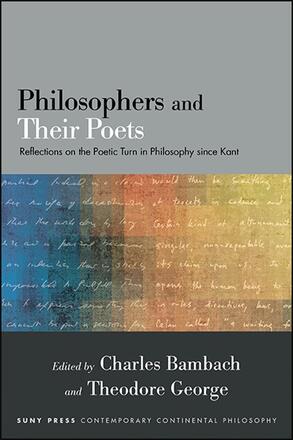
Philosophers and Their Poets
Reflections on the Poetic Turn in Philosophy since Kant
Alternative formats available from:
Examines the role that poets and the poetic word play in the formation of philosophical thinking in the modern German tradition.
Description
Several of the most celebrated philosophers in the German tradition since Kant afford to poetry an all-but-unprecedented status in Western thought. Fichte, Hegel, Nietzsche, Heidegger, and Gadamer argue that the scope, limits, and possibilities of philosophy are intimately intertwined with those of poetry. For them, poetic thinking itself is understood as intrinsic to the kind of thinking that defines philosophical inquiry and the philosophical life, and they developed their views through extensive and sustained considerations of specific poets, as well as specific poetic figures and images. This book offers essays by leading scholars that address each of the major figures of this tradition and the respective poets they engage, including Schiller, Archilochus, Pindar, Hölderlin, Eliot, and Celan, while also discussing the poets' contemporary relevance to philosophy in the continental tradition.
Above all, the book explores an approach to language that rethinks its role as a mere tool for communication or for the dissemination of knowledge. Here language will be understood as an essential event that opens up the world in a primordial sense whereby poetry comes to have a deeply ethical significance for human beings. In this way, the volume positions ethics at the center of continental discourse, even as it engages philosophy itself as a discourse about language attuned to the rigor of what poetry ultimately expresses.
Charles Bambach is Professor of Philosophy at the University of Texas at Dallas. He is the author of several books, including Thinking the Poetic Measure of Justice: Hölderlin–Heidegger–Celan, also published by SUNY Press. Theodore George is Associate Professor of Philosophy at Texas A&M University. He is the author of Tragedies of Spirit: Tracing Finitude in Hegel's Phenomenology and the translator of Günter Figal's Objectivity: The Hermeneutical and Philosophy, both also published by SUNY Press.
Reviews
"With its impressive range of both philosophers and poets, this volume opens up new avenues of thinking at the intersections of philosophy and poetry. " — Robert D. Metcalf, cotranslator of Martin Heidegger's Basic Concepts of Aristotelian Philosophy